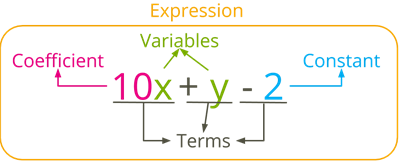PDF chapter test TRY NOW
Let us recollect the terms we learned in the previous grade under the topic algebraic expression:
Variables: A variable is an unknown value symbol. It is usually denoted as x, y, a, b.
Constant: A number which standalone without any variable is known as constant.
Terms: Terms are either variables, numbers, or variables multiplied with numbers. An algebraic operation like addition and subtraction separates terms.
Coefficient: A coefficient can either be a numerical factor or an algebraic factor or product of both that is a number used to multiply a variable.

Polynomial is a type of algebraic expression.
Let us see the concept of the polynomial.
Polynomial is an expression consisting of variables and coefficients which involves operations such as addition, subtraction, multiplication, and non-negative integer exponents.
Example:
Consider an expression .
The above expression is a polynomial expression because the expression involves the variables(x) and coefficients, and the terms are separated by subtraction and addition. Also, the exponents(x^{2} and x) of the variables are non-negative integers.
Where p(x) is the polynomial of x, x is the variable, 1 is the coefficient of x², -8 is the coefficient of x, and 9 is the constant.
Important!
Polynomials are generally indicated based on the variables involved in the expression. If the variable in the polynomial is 'x', then it can be denoted as or or , etc.
Example:
Let us check the following algebraic expressions are polynomials or not.
1. x^{2} + 6x
Here the terms x^{2} and 6x are connected by addition operation, and exponents of the variable x is a whole number.
Thus, the expression x^{2} + 6x is a polynomial expression.
2. \frac{1}{x}.
The reciprocal of the expression is x^{-1}.
Thus, the expression has a negative exponent.
Therefore, the expression is not a polynomial.
3. y^{3}-3x^{2}y+3xy^{2}+x^{3}
Here the terms y^{3}, 3x^{2}y, 3xy^{2} and x^{3} are connected by addition and subtraction.
Also, the exponents of all the variables(powers of x and y) are the whole number.
Thus, the expression y^{3}-3x^{2}y+3xy^{2}+x^{3} is a polynomial expression.
4. z^{3}-8\sqrt{z}
The exponent of z in the second term is \frac{1}{2}. It is not a whole number.
Thus, the expression has non-integer exponent.
Therefore, the expression is not a polynomial.
Polynomials in day-to-day life:
1. Polynomials are typically used in the fields of Physics, Chemistry, Civil Engineering, Finance, and so on.

2. A polynomial can be graphically represented.

